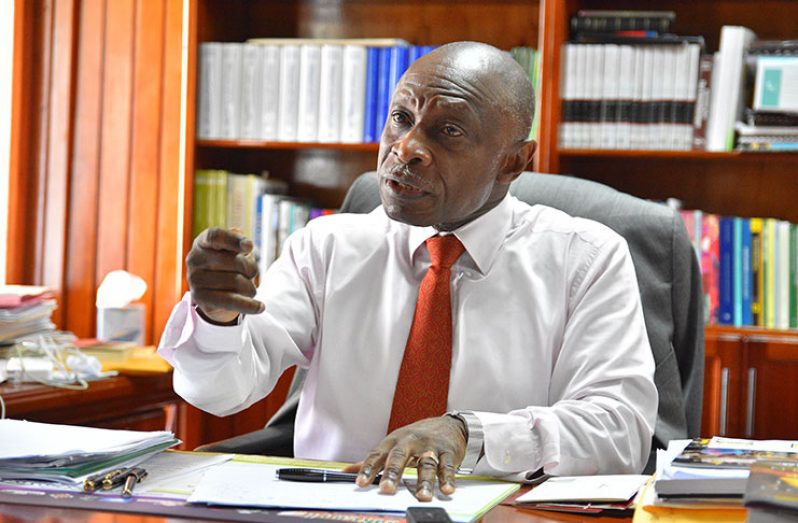– says ICJ ruling must be respected
VICE-PRESIDENT and Foreign Affairs Minister, Carl Greenidge is maintaining that the decision of the International Court of Justice (ICJ) on the territorial controversy between Guyana and Venezuela will be final, and countries must respect that ruling.
Since 1962, Venezuela has been contending that the 1899 Arbitral Award, which it had agreed to, is null and void. The ICJ will now determine the validity of the 1899 Arbitral Award regarding the boundary between Guyana and Venezuela.
On Friday, the Venezuelan Government renewed calls for the continuation of the Good Offices process, but Minister Greenidge, on Saturday, made it clear that the Good Offices process is a thing of the past.
“Venezuela, at this point in time, needs to deal with the new arrangement that is now in place to resolve the issue and that is not the Good Offices process,” he said while adding that “resolution of the issue does not depend on Venezuela agreeing… the court will make a decision, and as members of the United Nations, we all must respect that decision.”
The territorial controversy between Guyana and Venezuela was referred to the ICJ by the United Nations Secretary General, Antonio Guterres, on January 30, 2018 after he concluded that the Good Offices process, which the parties had engaged in for almost 30 years, had failed to achieve a solution to the controversy.
In keeping with a request put forward by the Government of Guyana in 2014 and 2015, the UN secretary-general chose the ICJ as the next means of settlement.
“Einstein is reputed to have said that insanity is repeating the same thing over and over again and expecting different results,” Minister Greenidge said while alluding to the fact that the Good Offices process was unsuccessful in reaching a solution.
Renewing its objection to a judicial settlement, Venezuela called on Guyana to re-establish diplomatic ties to allow for a “practical and satisfying solution to the territorial controversy” surrounding the Essequibo region.
“Under the aegis of the Geneva Agreement of 1966, the Government of the Bolivarian Republic of Venezuela proposed the Government of the Co-operative Republic of Guyana to re-establish the diplomatic contacts that allow for a practical and satisfying solution of the territorial controversy,” the Venezuelan Government said in a statement on Friday.
The statement was issued one day after Guyana submitted its application to the ICJ requesting the court to confirm the legal validity and binding effect of the 1899 Arbitral Award regarding the boundary between Guyana and Venezuela.
On the issue of re-establishing “diplomatic contacts”, Minister Greenidge stated that the two countries are in diplomatic contact, and the ambassadors along with the ministers have been in contact formally, and informally. Hence, there is no need for the re-establishing of contacts that already exist.
Guyana, through its Vice President and Minister of Foreign Affairs, Carl Greenidge, on Thursday initiated the judicial process by handing over its application to Philippe Couvreur, Registrar of the ICJ. Vice President Greenidge will serve as the country’s agent in the proceedings before the court.
In a statement, the Foreign Affairs Ministry said that Guyana in its application highlighted that Venezuela had for more than 60 years consistently recognised and respected the validity and binding force of the 1899 Award and the 1905 map agreed by both sides in furtherance of the award.
“Venezuela had only changed its position formally in 1962 as the United Kingdom was making final preparations for the independence of British Guiana and had threatened not to recognise the new State, or its boundaries, unless the United Kingdom agreed to set aside the 1899 Award and cede to Venezuela all of the territory west of the Essequibo River, amounting to some two-thirds of Guyana’s territory,” the statement by the Foreign Affairs Ministry said.
Guyana contends that while Venezuela has never produced any evidence to justify its belated repudiation of the 1899 Award, it has used it as an excuse to occupy territory awarded to Guyana in 1899, to inhibit Guyana’s economic development and to violate Guyana’s sovereignty and sovereign rights.
Vice President Greenidge noted that Guyana, in filing its application to the ICJ, has respected the UN secretary general’s decision and placed its faith in the ICJ to resolve the controversy in accordance with its statute and jurisprudence, based on the fundamental principles of international law, including the sanctity of treaties, the maintenance of settled boundaries and respect for the sovereignty and territorial integrity of States.



.jpg)









